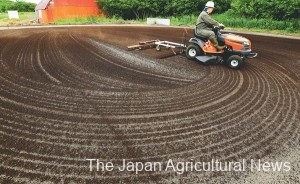HOKKAIDO, Sept. 7 — Production of pelletized compost Shimizu Yuki is in full swing at a composting facility of JA Tokachi Shimizu, an agricultural cooperative in the town of Shimizu in Hokkaido.
The pelletized compost is produced by mixing cattle and chicken manure collected in Shimizu, a major dairy farming region.
The pellets are spread out on the ground in front of the composting facility to be sun-dried as part of the finishing process.
Summer is the season best fit for pelletized compost production because the product can be manufactured at lower energy costs thanks to high temperatures that speed up fermentation and strong sunlight that helps drying.
As production capacity drops during winter, the facility is currently operating at its full capacity to be ready for spring when demand for compost reaches its peak.
The annual production at the facility is roughly 900 tons and 90% of the production is completed by September.
To dry the pellets in the sun, a worker riding on a mower tows a self-made rake to spread them out on paved ground to make it easier for them to dehydrate to reduce the moisture content to about 20%.
While machinery drying using kerosene can process around a ton of pellets a day, sun-drying enables processing of approximately 3 tons in a day.
“The greatest challenge is how to reduce the moisture content,” says a JA Tokachi Shimizu official. “We are working to boost production at the lowest possible cost.”
The farm coop sells vegetables such as garlic and asparagus grown using Shimizu Yuki under the Toretanto brand.


